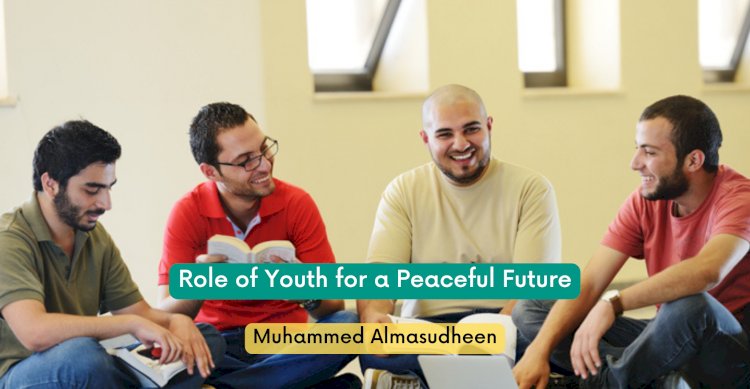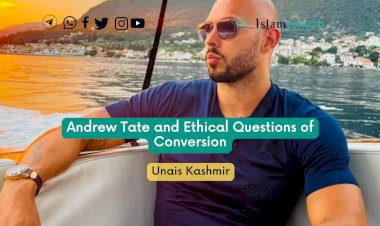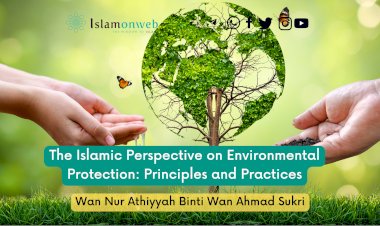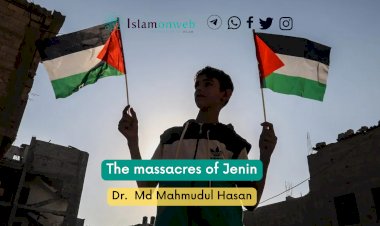Role of Youth for a Peaceful Future
“You can’t separate peace from freedom because no one can be at peace unless he has his freedom” -Malcolm x
A peaceful future is the time where all citizens live in harmony and brotherhood, free from the scourge of wars and fear. It's a future where individuals support one another, fostering a sense of unity. Islam, a religion that promotes peace and harmony, carries the message of living peacefully. Prophet Muhammad ﷺ, in his wisdom, conveyed this message when he said, “O ‘Uqbah, reconcile with whoever cuts you off, give to whoever deprives you, and forgive whoever wrongs you.”[i] These teachings demonstrate Islam's emphasis on harmony and the rejection of lying, as falsehood can lead to forbidden activities, as mentioned in the Quran: "It is those who believe not in the Signs of Allah, that forge falsehood: it is they who lie!."[ii]
However, a single glance at the world reveals that it is far from the ideal of peace and harmony. In every corner of the globe, pleas for lives and justice are heard. Racism persists as a global issue, with humanity dividing itself along lines of skin color and religion. Moreover, the world witnesses a litany of crimes: students subjected to unbearable acts, women falling victim to domestic violence, and rampant break-ins into homes, offices, and shops. Additionally, political exploitation and election rigging contribute to the erosion of trust in governance. It is undeniable that without altering this trajectory, we cannot hope for a bright future illuminated by the brilliance of our innovative youth. The words of Mahatma Gandhi serve as a poignant reminder: "The future depends on what you do today." To achieve the peaceful future we desire, it is imperative that we address these issues and work towards a world where harmony, justice, and compassion prevail.
Role of Youth in Shaping a Peaceful World
Islam places great emphasis on the role of youth in shaping a prosperous future, recognizing their potential for development and efficiency. The Prophet Muhammad ﷺ, in his wisdom, advised the youth to make the most of their youth, health, wealth, free time, and life itself. In the hadith, Ibn Abbas (r.a.) reported: The Messenger of Allah ﷺ “Take advantage of five before five: your youth before your old age, your health before your illness, your riches before your poverty, your free time before your work, and your life before your death.” This guidance aligns with modern scientific understanding, which acknowledges the vitality and innovation of young minds.
While Islam encourages development and brotherhood, it does so through peaceful means, rejecting war, cruelty, and destruction in favor of peace, harmony, brotherhood, and good governance. A key aspect of this approach is the promotion of capable and trustworthy leaders, as leaders have the power to positively impact their societies. Prophet Muhammad ﷺ affirmed this by stating that everyone is a leader and will be held accountable for their leadership. In the hadith reported by Abdullah bin Umar (r.a.), the Messenger of Allah ﷺ said: "All of you are guardians and are responsible for your subjects. The ruler is a guardian of his subjects, the man is a guardian of his family, the woman is a guardian and is responsible for her husband's house and his offspring; and so all of you are guardians and are responsible for your subjects."[iii]
Youthfulness is a phase of life that fosters efficiency and innovation. Young minds are typically more vibrant and open to creative thinking, making them valuable assets for a nation's success. In today's world, where technological advancements and global security are at the forefront, the role of youth is particularly significant. Historically, conflicts have arisen over various issues, from basic survival needs to ideological disputes, and now the competition for economic and technological supremacy dominates. Islam recognizes the importance of harnessing the energy and potential of youth. The Quran emphasizes the value of youthful believers who were guided and supported by Allah, saying: "We relate to thee their story in truth: they were youths who believed in their Lord, and We advanced them in guidance."[iv] This readiness and vigor of youth make them well-equipped to face challenges and drive positive change. For instance, in movements like the Nirbhaya Case protests, it was predominantly young people who displayed intelligence and courage in challenging the status quo.
To guide humanity towards peace and a brighter future, it is crucial to support and empower the youth, not only at a local but also at an international and political level. Encouraging youth participation in politics and leadership positions is vital for shaping a better world. However, in today's world, many young individuals face unfavorable environments characterized by illness and a lack of education, which can hinder their path to a successful and productive youth. Addressing these challenges is essential to ensure that young people can realize their potential and contribute positively to society.
Prospective Challenges
In our exploration of the pivotal role that youth play in shaping a brighter future, we must acknowledge the extensive challenges they encounter along their path to positive change. These challenges, ranging from local to global in scope, have far-reaching implications for young people across the world. To comprehensively understand this intricate landscape, it is essential to delve into these multifaceted challenges, all while considering both Islamic perspectives and worldly views. Let us examine some of these pressing challenges.
Child nutrition stands as a critical concern in our times, with approximately 7 billion children succumbing to malnutrition before the age of 5. This distressing reality calls for urgent interventions, including immunization, the provision of bed nets, the distribution of essential micronutrients, and measures to prevent mother-to-child transmission of HIV. It is noteworthy that Islam consistently encourages the welfare of children, resonating with its emphasis on caring for elders. Prophet Muhammad's ﷺ teachings underscore this, emphasizing that failing to show mercy to children or recognize the rights of the elderly is contrary to the essence of the faith. In the hadith Amr bin Shu'aib reported that the Messenger of Allah ﷺ said:
ليس منا من لم يرحم صغيرنا، ويعرف شرف كبيرنا""
"He is not one of us who shows no mercy to younger ones and does not acknowledge the honour due to our elders".[v]
Maternal mortality is another formidable challenge, affecting around 3 billion women who lack adequate nutrition. Tragically, many women lose their lives during pregnancy, a circumstance that significantly impacts the survival, health, and development of children. Prevention measures include ensuring access to proper nutrients, improving hospital facilities, and creating clean and safe environments for mothers. While there isn't a specific hadith that directly addresses maternal mortality in the context of modern healthcare and nutrition, the general principles of compassion and care for mothers can be found in various hadith. Prophet Muhammad ﷺ emphasized the importance of taking care of mothers and pregnant women, and these principles can be applied to the prevention of maternal mortality through proper nutrition and healthcare. There are hadith that highlight the significance of respecting and caring for mothers. This is could be understood in the narration of Mu'awiyah bin Jahimah As-Sulami (r.a.), that Jahimah came to the Prophet (ﷺ) and said: "O Messenger of Allah! I want to go out and fight (in Jihad) and I have come to ask your advice." He said: "Do you have a mother?" He said: "Yes." He said: "Then stay with her, for Paradise is beneath her feet."[vi] While these kinds of hadith do not specifically mention nutrition or healthcare facilities, they emphasize the broader principle of respecting and caring for mothers, which can be applied to maternal health and well-being in a comprehensive sense.
The scourge of violence and abuse against children and youth has become distressingly common in today's world, with issues such as drug abuse and child labor plaguing societies. Islam, as a religion of peace and harmony, consistently reminds us to safeguard the well-being of children. The words of the fourth caliph of Islam, urging against obliging children to work, serve as a poignant reminder of this responsibility. In the hadith, Uthman bin Affan (r.a.) reported:
لا تكلفوا الأمة غير ذات الصنعة فإنكم متى كلفتموها ذلك كسبت بفرجها ولا تكلفوا الصغير الكسب، فإنه إذا لم يجد فإنه سرق
Do not burden a female slave (to work) who is not skilled, for when you burden her with that (to earn money), she will use her genitals (to get the money). And do not burden a child to work, for if he does not find it, he will steal it.[vii]
Furthermore, the lack of access to quality education and opportunities poses a significant threat to the development of children. Despite the commendable efforts of numerous organizations, the results remain incomplete. Islam, a religion that values knowledge, underscores the importance of providing children with a strong educational foundation. The teachings of Prophet Muhammad ﷺ emphasize the significance of nurturing children's character and knowledge. The Prophet ﷺ said:
مَا نَحَلَ وَالِدٌ وَلَدًا مِنْ نَحْلٍ أَفْضَلَ مِنْ أَدَبٍ حَسَنٍ
"There is no gift that a father gives his son more virtuous than good manners."[viii]
The consequences of neglecting the potential of children ripple into the youth, as their bright future hinges on the skills and opportunities they are afforded. By empowering youth, entrusting them with leadership roles, and supporting their initiatives, we enable them to conduct campaigns that promote peace, gain a deeper understanding of the challenges faced by people globally, and hold worldwide meetings to secure the future of their nations and enhance underdeveloped resources. It is a recognition that when a nation has more hands to work than mouths to feed, the economic trigger is pulled, ensuring prosperity. Indeed, the youth hold the power to make their nations flourish and shine with success, paving the way for a brighter tomorrow.
Conclusion
In conclusion, it's crystal clear that young people play a vital role in creating a peaceful world. Islam teaches us to value the energy and ideas of youth. The Prophet Muhammad ﷺ wisely advised us to make the most of our youth, health, wealth, free time, and life itself. But when we look at the world today, we see many challenges. There's still racism, violence, and injustice. We witness crimes against students and women, and trust in leaders is fading. To build a bright future, we must tackle these issues head-on.
References
Ricigliano, R. (2012). Making Peace Last: A Toolbox for Sustainable Peacebuilding (1st ed.). Routledge.
Abu-Nimer, Mohammed (2003). Nonviolence and Peace Building in Islam: Theory and Practice. University Press of Florida.
Ibn Hanbal, Ahmad b. Muhammad. Musnad al- imam Ahmad bin Hanbal
Al-Bayhaqi, Abū Bakr Aḥmad. Shuab ul Iman
Al-Nawawi, Yahya b. Sharaf. Riyad as-Salihin
Al-Bukhari, Muhammad b. Isma'il. Al-adab al-mufrad
Ibn Anas, Malik. Muwatta
Al-Tirmidhi, Abu `Isa Muhammad. Jami` at-Tirmidhi
Endnotes
[i] Musnad, Hadith No.17452
[ii] Holy Quran: 16:105
[iii] Riyad as-Salihin 283.
[iv] Holy Quran: 16/13
[v] Riyad as-Salihin 355
[vi] Sunan an-Nasa'i 3104. B.25, h.20. (Sunnah.com)
[vii] Kitabul Jāmi’, Babu Ma jā’ fil Mamlūk-e w hibatihi
[viii] Jami` at-Tirmidhi 1952, b.27, h.58 (Sunnah.com)
About the author
Muhammed Almasudheen is a student of Al-Hidaya Islamic Academy, Kalamaserry, affiliated to Darul Huda Islamic University.
Disclaimer
The views expressed in this article are the author’s own and do not necessarily mirror Islamonweb’s editorial stance.

























Leave A Comment